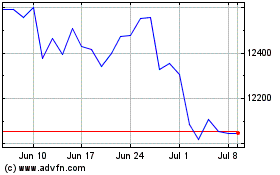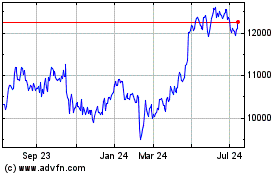South Africa Skips National Regulatory Approval to Secure Covid-19 Vaccines -- Update
January 07 2021 - 2:47PM
Dow Jones News
By Gabriele Steinhauser
JOHANNESBURG -- South Africa will start rolling out Covid-19
vaccines without requiring local regulatory approval of the shots,
a step that other low- and middle-income countries scrambling to
inoculate their populations against the coronavirus are expected to
follow.
South Africa's health ministry said the country will in January
receive 1 million doses of the vaccine developed by the University
of Oxford and AstraZeneca PLC from the Serum Institute of India,
which has an agreement to manufacture and distribute the shots. A
second shipment of 500,000 doses is expected for February. The
vaccine requires two doses to reach its full effect.
Other countries across Subsaharan Africa and the developing
world are likely to emulate South Africa's decision to bypass local
regulators in an effort to expedite getting shots for at least some
of their most-at-risk citizens. Some lack their own national
drug-approval authorities and are expected to rely on certification
from the World Health Organization for rolling out Covid-19
vaccines.
The shots South Africa has ordered from India will be given to
health care workers, who have borne the brunt of a surge in new
cases of Covid-19. Researchers believe that the new wave in
infections has been exacerbated by a new, likely more transmissible
variant of the coronavirus discovered in the country. In December
alone, 5,000 health care workers tested positive for the disease,
placing an additional burden on hospitals already struggling.
South Africa, a country of 60 million people, reported on
Wednesday 21,832 fresh cases of Covid-19, its highest daily count,
and 392 deaths. Nearly one-third of coronavirus tests are coming
back positive -- an indication that the true number of infections
is likely much higher -- and the South African Medical Research
Council said it recorded nearly 7,000 excess deaths in the week of
Christmas, most of them likely due to Covid-19.
Allowing the distribution of the Oxford-AstraZeneca vaccine
without first registering it with the South African Health Products
Regulatory Authority is an unusual step for the country, which has
established procedures for certifying new drugs. It highlights the
public pressure on the government for not moving faster to secure
vaccines, as well as fears that some manufacturers were dragging
their feet on applying for approval in South Africa.
A senior health-ministry official said Sunday that no vaccine
maker had filed the final paperwork for approval in South Africa.
During a news conference, Anban Pillay, a deputy director at the
ministry, detailed how officials had "tried to persuade" U.S.-based
Moderna Inc. to register its vaccine -- already approved in America
and the European Union -- in South Africa. "It's clear they have no
intention of filing a dossier with SAHPRA at this stage," he
said.
A Moderna spokesman said the company didn't understand South
African health officials to be requesting it to register its
vaccine there. He said Moderna remained in productive talks with
South Africa on supplying its vaccine to the country and when it
could do so.
Dr. Pillay said Sunday that he expected Pfizer Inc., whose shots
have also been approved in the U.S. and the EU, and Johnson &
Johnson, whose vaccine has yet to be approved anywhere, to complete
their applications for registration with SAHPRA by the end of the
month.
The main reason for some vaccine makers' slow pace of requesting
approval in less significant markets is a lack of available doses.
Most makers of approved or promising Covid-19 vaccines have already
sold all doses due to be manufactured this year to governments in
rich countries.
Many poor countries have pinned their hopes on getting Covid-19
vaccines on a global initiative -- sponsored by richer nations and
charitable organizations such as the Bill & Melinda Gates
Foundation -- that is ordering doses in bulk. That initiative,
called Covax, aims to supply vaccines to 20% of participating
populations by the end of 2021.
The deal with the Serum Institute of India is South Africa's
first bilateral agreement with a vaccine maker and comes after the
company said previously that it would only start exporting doses in
March or April. South Africa has also ordered vaccines for 10% of
its population from the Covax initiative. As an upper-middle-income
country, South Africa will have to pay for these vaccines
itself.
On Thursday, South Africa's Health Minister Zweli Mkhize noted
that the Oxford-AstraZeneca vaccine had already been approved in
several countries, including the U.K. and India. "As part of
expediting the regulatory process, SAHPRA is applying reliance on
that regulatory work, " he said.
It is unclear whether the shots will be distributed before
getting the results of a South African trial of the vaccine, which
are expected in the coming weeks. That trial will show whether the
shots are equally effective against the new Covid-19 variant
spreading in the country.
Shabir Madhi, the chief investigator of the trial, said the
variant -- which in laboratory tests appeared to be resistant to
some of the antibodies the body employs to fight Covid-19 -- may
make the vaccine less effective, without given details. Earlier
trials in the U.K. and Brazil showed that the Oxford-AstraZenca
vaccine was 62% effective in preventing symptomatic Covid-19.
Aaisha
Dadi Patel
contributed to this article.
Write to Gabriele Steinhauser at
gabriele.steinhauser@wsj.com
(END) Dow Jones Newswires
January 07, 2021 14:32 ET (19:32 GMT)
Copyright (c) 2021 Dow Jones & Company, Inc.
Astrazeneca (LSE:AZN)
Historical Stock Chart
From Mar 2024 to Apr 2024

Astrazeneca (LSE:AZN)
Historical Stock Chart
From Apr 2023 to Apr 2024
